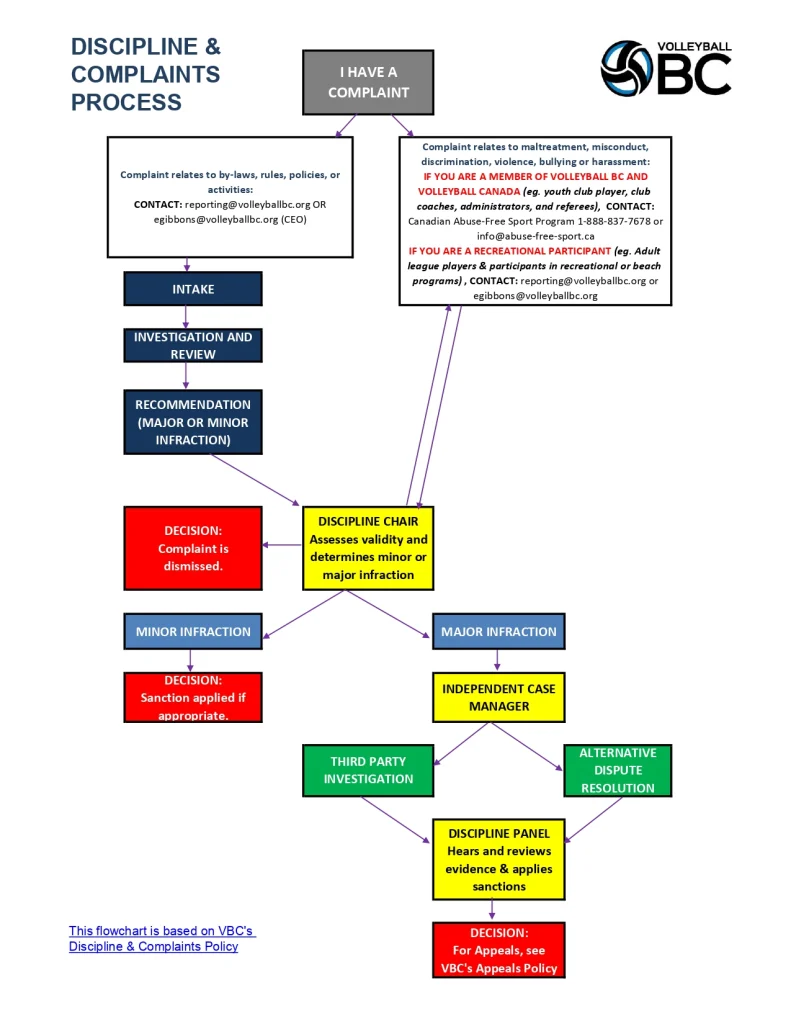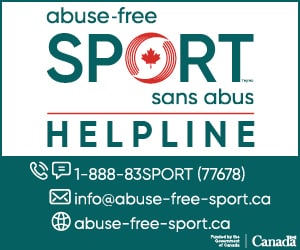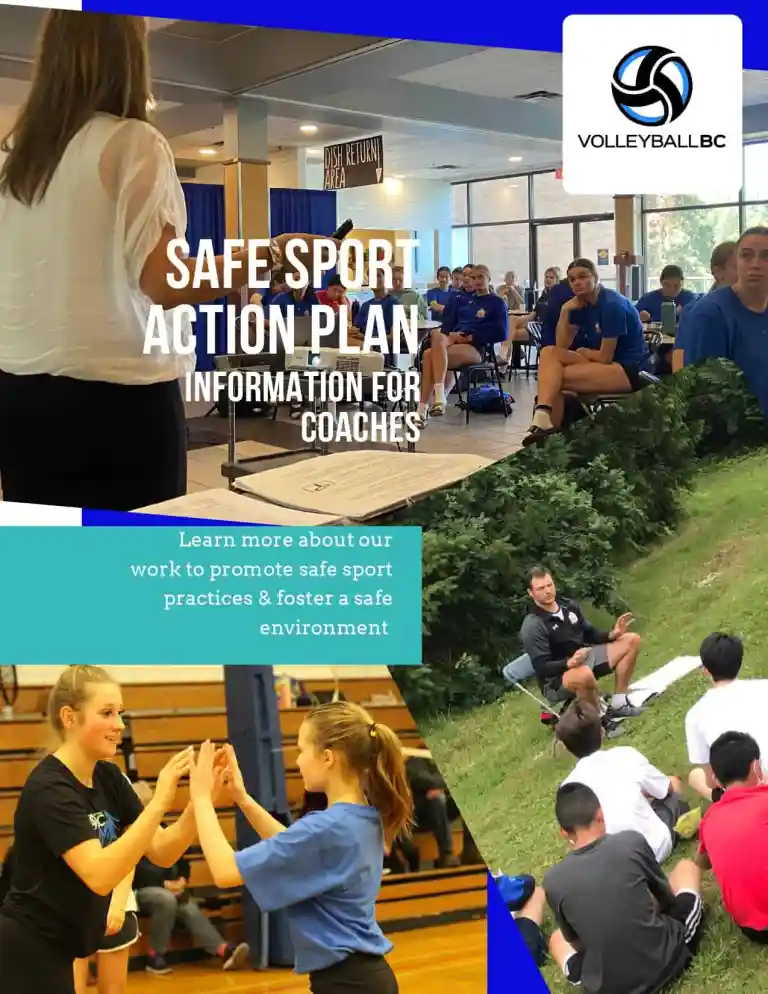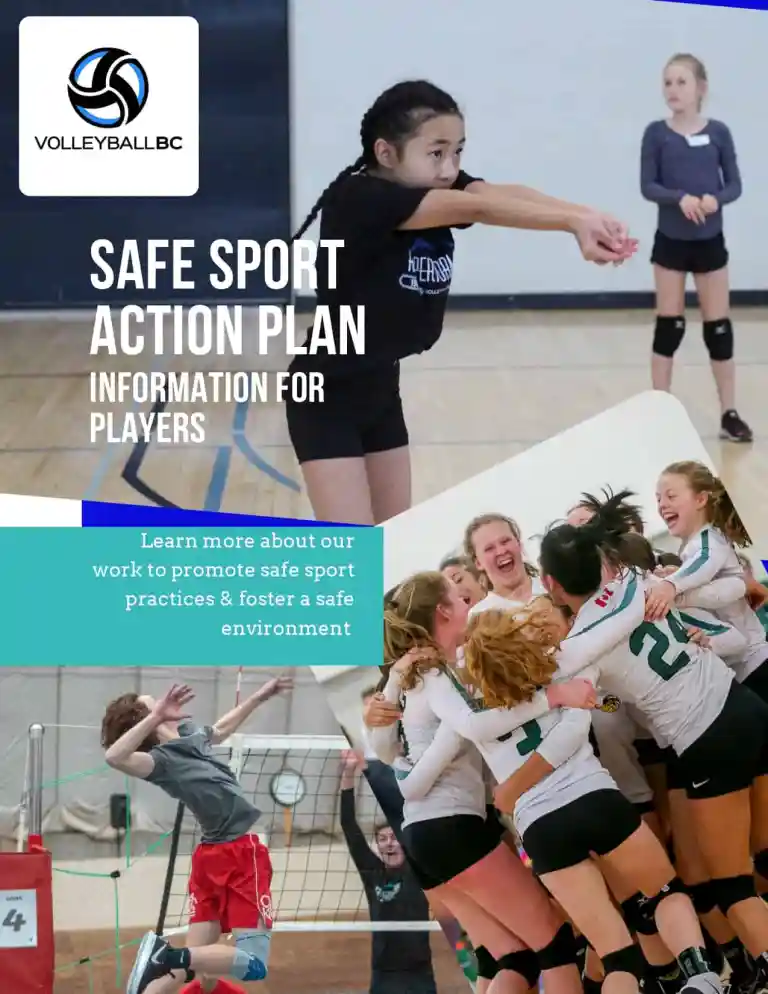SAFETY HUB
Bullying
Bullying
Learn MorePhysical Injury & Concussion
Physical Injury & Concussion
Learn MoreMental Health
Mental Health
Learn MoreWHAT IS VOLLEYBALL BC DOING ABOUT SAFETY?
- Creating a Safe Sport Working Group with representatives from
- across the sport
- Surveying our membership about their experiences
- Conducting focus groups with Team BC athletes
- Reviewing best practice and assessing priorities in our sport
Making a complaint
Despite our best efforts, sometimes things happen. Volleyball BC has a Code of Conduct that every participant agrees to uphold when they register. This governs Volleyball BC’s events, activities, and member clubs.
We have a process in place to address issues or behaviours that contravene our Code of Conduct. This flowchart shows the process
To help you navigate our Discipline and Complaints and Appeal processes, we have created this guides:
- Understanding Discipline and Complaints process – English
- Understanding Discipline and Complaints Process – French
- Understanding Discipline and Complaints Process – Cantonese
- Understanding Discipline and Complaints Process – Mandarin
- Understanding Discipline and Complaints – Persian
- Understanding the Appeal Process – English
- Understanding the Appeal Process – French
- Understanding the Appeal Process – Cantonese
- Understanding the Appeal Process – Mandarin
- Understanding the Appeal Process – Persian

Reporting Abuse
Volleyball Canada and Volleyball BC have zero tolerance for any type of abuse. Individuals are required to report abuse or suspected abuse to Volleyball Canada or to VBC so that those matters can be addressed in an expeditious manner. You can report an issue in the following ways:
Volleyball BC has an independent third-party to review safe sport complaints. This is provided through the Abuse-Free Sport Program that offers a centralized “one stop shop” for managing complaints of abuse and maltreatment. Where there are admissible allegations of abuse, harassment or discrimination, the Office conducts independent investigations and recommends sanctions against individuals who violate our Code of Conduct.
Contact Abuse-Free Sport – 1-888-837-7678 or info@abuse-free-sport.ca or http://abuse-free-sport.ca/en/
The helpline will provide you with advice, guidance and resources on how to proceed/intervene appropriately in the circumstances.
NOTE: The Abuse Free Sport Program is available to anyone who is a registered full member of Volleyball BC and Volleyball Canada (such as youth club players, club coaches, club administrators and referees). For recreational participants (such as adult league players and participants in our recreation programs), please file any safe sport complaints directly with Volleyball BC as outlined below.
Any VBC Member may report to the VBC Head Office any complaint of an infraction by a member. Such a complaint must be signed and in writing and must be filed within fourteen (14) days of the alleged incident. If a complaint is related to abuse or suspected abuse, VBC will refer the complaint to the Abuse-Free Sport program or to an independent third party in line with the Discipline and Complaints Policy. You can report any complaints to Volleyball BC at reporting@volleyballbc.org


Safe Sport Action Plan – Information for Referees

Safe Sport Action Plan – Information for Coaches

Safe Sport Action Plan – Information for Players
Seeking Support
Speak to a health professional to find out about resources and strategies to handle what you are experiencing. There are also many free, confidential, and easy-to-use resources that you can access for help and support:
- Canadian Mental Health Association
- Canadian Centre for Mental Health and Sport
- Headshpguys.org
- Youthspace.ca – live chat from 6pm-midnight PST.
- Kids Help Phone – Text Services: Text “CONNECT” to 686868 or Chat Services:
- Crisis Services Canada – Suicide Prevention Service: 1-833-456-4566 (available 24/7)
Consider sharing your story and experiences with your team.
Sharing your story and experiences with your team or with your coach can be a good way to educate them about mental health and destigmatize the issue. It might also help them understand how they can support you. However, sharing your story can also be a deeply personal experience. You may want to start with a select group of individuals whom you trust. This can be a good way to develop a smaller group of supporters, before opening up to the rest of the team if you feel that is needed.
When you share your experience, it’s important that you feel safe to do so. It would be advisable to ensure one or two of your trusted teammates can be there to give you support. Expect that your team may ask for ways they can help. Have some ideas about what would potentially help, and what would not be helpful (this is just as important!)
Sources and Useful Information
More Resources
We heard from the volleyball community that there were particular mental health issues that needed addressing. Our toolkit comes with dedicated resources on a number of these topics. Click to download the factsheets.
Body image and disordered eating
Athlete self-care and stress reduction.
Activity Card – Mood Music Exercise
We are also hosting webinars on some of these topics. Check out section D above for links to the recordings.
